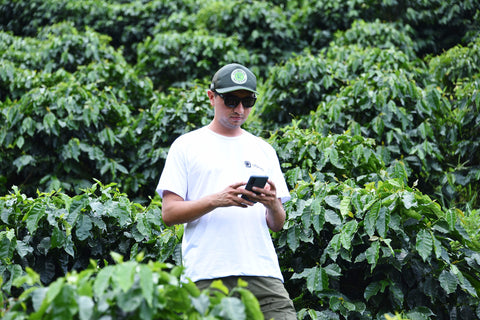Join us for a conversation with team Algrano, a proud partner of Standart Issue 27.
Algrano won the Best New Product Award in the Technology category for your CRM software “My Customers” at the 2022 World of Coffee expo in Milan. Would you tell us what the aims are for the “My Customers” platform and how it’s different to other CRMs on the market?
Our goal is to make producers more successful as sellers on Algrano (and on other sales channels too). By successful we mean that they’ll be able to sell more coffee, build relationships with roasters that last (and grow), and learn about buyers to make better business decisions.
"There is a lot of greenwashing. But these days it’s easy to see who can back their claims and who cannot."
On My Customers, sellers can see the roasters that ordered samples from them and receive sample reviews focused on the intent of purchase. If a roaster marks a sample as a good match for their needs, the producer can write a message to improve his or her chances of making a sale. If a roaster says the sample is not a match (here they can also say why not), the producer can offer a different coffee or try to further understand why the coffee doesn’t fit.

Over time, the producer can understand which coffees are popular and why some coffees are harder to sell than others. Is it the sensory profile? Is it the timing of the offer? Is it a lack of information/credibility?
All this should help them make offers that are more suited to what buyers are looking for. Traditionally, this information has only been available to importers with sales teams on the ground or producers with enough capital to have stock and staff in Europe. With My Customers, this becomes available to a wider range of producers.
“The information on the platform is absolutely useful and the changes made are amazing. The first thing we use is the information on coffees that we sold. It gives us the insight on what the European market is looking for and how price sensitive it is. We learned a lot from it!” - Adrian Cabrera, Commercial Manager at San Miguel Coffees, Guatemala
The main difference between this CRM to others is that it is built for green coffee. Though there are many communication tools that we can build to improve the interaction between producer and buyer, My Customers gives sellers visibility of leads from the moment of the sample order.

With this kind of information, producers can be much more proactive in the whole sales process. We hope that this facilitates a change in mentality as well as a change in the process.
Many producers are not used to seeing themselves as sellers. Yet, they know more about their coffees than anyone else and they are in the best position to market their beans with in-depth information.
“I find the platform to be one of the best I have ever used. And believe me, I have been doing e-commerce for over 10 years! I use the information on My Customers to get in touch with roasters once they purchase a coffee. Once the bags have arrived, I contact them again. It is easy to keep track of your customers though that tab.” - Gaizka Pujana, General Manager at AsisteCampo, Colombia
We hope My Customers will speed up this shift in the mentality of producers, helping them learn about how roasters source coffee and how they can best meet their needs. The more they understand, the better they can decide where to invest in terms of post-harvest technology, new varieties, lot separation, etc.
Producers have not been at the forefront of the trading process traditionally. How did the direct trade movement improve things, and how did it not go far enough? How is Algrano helping to overcome these shortcomings?
We wrote a little bit about direct trade movement here and believe the last edition of The Coffee Guide puts the shortcomings of direct trade well in this quote: “The direct trade model has developed slowly because, to work smoothly, it requires a great deal of input, a solid infrastructure and a high level of know-how and business skills – all of which are often lacking, as farmers and roasters are typically unfamiliar with the requirements and realities of international trading and logistics. Direct trade is often unnecessarily expensive and inefficient because many small producers and roasters do not have the resources or knowledge to manage international requirements.”

Logistics is one of the biggest challenges for both roasters and producers to trade directly because buyers often can’t fill containers. Some importers started offering logistics to roasters on a small scale, but this has never been anyone’s business model. This is where Algrano stands out.
Our business model was built around offering solutions in logistics for green coffee purchases that are too small to justify shipping. What we do is consolidate orders from multiple roasters, made to multiple sellers, in the same containers. We partner with exporters that offer this service at origin and we do the same at destination.
Consolidation is a huge amount of work. It involves multiple contracts, coffee deliveries to organise in time for shipping, dozens of samples to approve, payments to make, etc. Normally, importers don’t want to do that work because they can’t control their earnings, the price or the relationship. It’s not financially interesting (if anything, it can be a liability).
"Many producers are not used to seeing themselves as sellers. Yet, they know more about their coffees than anyone else and they are in the best position to market their beans with in-depth information."
What Algrano does is specialise in this kind of operation and make it financially viable for everyone in the supply chain. We also pay the producer before we are paid ourselves and offer to finance roasters. This way, producers don’t have to finance themselves for long periods of time, which could happen if a roaster was paying them directly. All payments happen when the container leaves the port, the same as with importers. In a sense, producers get the best of both worlds: they don’t have to wait months and months to be paid (or to risk a roaster not paying at all or being delayed) and can build relationships.

Another big challenge for direct trade is planning. Roasters have to plan their purchases months before they start roasting a coffee. Algrano helps with that by giving full visibility on shipment timelines and delivery dates. Our team discusses timelines with all producers on the platform so we can plan shipping periods and give roasters a delivery month that is accurate. We also help them secure coffees that might sell out fast when production volumes are low by pre-contracting.
Our next move is to provide financing to producers. We’re currently piloting this initiative with a small number of sellers to understand where and when we can offer this service to more of our Verified Sellers.
In the case of cooperatives, for example, this allows them to buy the coffee from their members so they can fulfil contracts to be delivered in the future. Without this type of pre-financing, they might struggle to do so.
Is there a role for consumers in this? How can consumers be sure that their purchasing practices are supporting producers in the right ways?
We believe consumers have a major role to play here. They are the ones who drive demand. When consumers favour roasters with responsible sourcing practices, the ones with relationships with their suppliers, roasters have to consider how they source more carefully.
It’s hard for consumers to make sure they are buying ethically because most roasters claim to have a responsible/sustainable approach. There is a lot of greenwashing. But these days it’s easy to see who can back their claims and who cannot.
Is the roaster informing about their sourcing practices in a vague or specific way? Do they have a transparency report? Can they tell what is the price (at least on FOB terms) that the producer received? Do they have an ongoing relationship with that producer?

These are all important questions for consumers and they can answer many of them with a quick search about the roaster on Google. If the information is not on the roaster’s website, they can ask. The more people ask, the more accountable roasters have to be.
“I think My Customers is very helpful. Sometimes I see that there has been a sample order from a roaster but he didn’t purchase the coffee. I usually contact them as a reminder and have had sales come through after that. After a message, some of them engage in it automatically and make an order.” - Valentin Kimeyini, Manager at Gasharu Coffee, Rwanda
Recently, Algrano deployed unique Relationship pages for each of the partnerships that were created on the platform. Like this one between APAS in Brazil and Kaffeemacher in Switzerland or this one between Girls Who Grind Coffee in the UK and Finca San Antonio Amatepec in El Salvador. This links back to the producer profile and shows when that relationship started.
All roasters on Algrano have access to this resource and can share that information with consumers. They can see photos uploaded by farmers and how the producer describes him or herself. It’s a great opportunity for consumers to build a closer relationship with farmers themselves.
This interview was published in partnership with Algrano.



